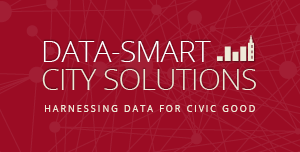Smart Chicago has committed to educate and engage residents with the new Array of Things project, which is operated by the Urban Center for Computation and Data (UrbanCCD) — a research initiative of the Computation Institute at the University of Chicago and Argonne National Laboratory — also in partnership with the City. This engagement work aligns with our guiding principles. We want to facilitate a conversation in Chicago about data, sensors, the Internet of Things, and how we can put these things in service to the people.
Put simply, it’s Smart Chicago’s job to make sure that the public knows about this project and that any resident who has questions or input is heard.
Array of Things is an urban sensing project — one of the first of this kind and scale. Sensors will be placed across the city to measure livability factors like climate, pedestrian traffic, air quality, and flooding. The sensors will collect data about our city. That data will then be released publically for residents and researchers to interpret and use.
Smart Chicago Engagement Goals
The first goal is to build citywide awareness around Array of Things. We’ll do this through writing, convening, polling, and otherwise communicating with residents.
The second goal is to aid the operators of Array of Things in their research and community needs. Here’s how we describe that work on our project page:
Specifically, we’re going to work together in the design and implementation stages of Array of Things to consider the general public’s use cases for the network and creating applications relevant to everyday life in Chicago. The main thrust of our work will be to design and implement a strategic plan to inform and engage the public in the deployment and utilization of AoT.
The third goal is to aid the City of Chicago in gathering input on the governance and privacy policy for Array of Things. A draft of this policy will be released in mid-June and a two-week public comment period will follow. This governance and privacy policy was developed in cooperation between the operators of the Array of Things and the City, with input provided by an independent policy board including the American Civil Liberties Union, the Electronic Frontier Foundation, and the Center for Applied Cybersecurity Research.
Managing feedback on the governance & privacy policy
Several methods will be used to collect resident feedback on the policy: public meetings, online forms, and Madison.
The OpenGov Foundation’s tool Madison is a government policy co-creation platform that collects public edits on policy or legislation. Here is how the OpenGov Foundation describes Madison:
Madison is a government policy co-creation platform that opens up laws and legislation previously off-limits to individuals and the Internet community. Launched to battle the Stop Online Piracy Act (SOPA), it has since been used to power citizen participation in government policymaking in the United States Congress. With Madison, you can access the law as it’s being written, leave comments, annotate specific content, and interact with other civic-minded participants. Madison brings the lawmaking process straight to you, and gives you a say in your government’s decisions.
During the public comment period for the Array of Things governance and privacy policy, the text of the policy will be posted on Madison. Interested Chicagoans will be able to sign on to Madison to annotate, comment on, or support the text.
Public meetings to learn, engage, and share
Smart Chicago will host public meetings in which residents can learn about Array of Things from the project’s operators, ask questions, and provide input through polling and community discussion.
These public meetings will have several components:
- A presentation on Array of Things from the project’s operators
- Community discussion and Q&A
- Resources for further action. We will have Laptops set up for residents to see the Array of Things website and provide feedback on the Array of Things governance and privacy policy
We will also have people working through our documenter program to record, archive, and share the proceedings.
We are holding two community meetings during June. The first will be at Lozano Library on Tuesday, June 14th from 5pm to 7pm. The second will be at Harold Washington Library on Wednesday, June 22nd from 5:30pm to 7pm. More details on those events will follow on the Smart Chicago blog.
If you would like to attend a public meeting or stay updated on the governance and privacy policy, fill out this form:
Fill out my online form.



